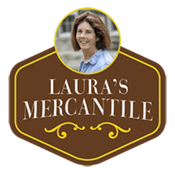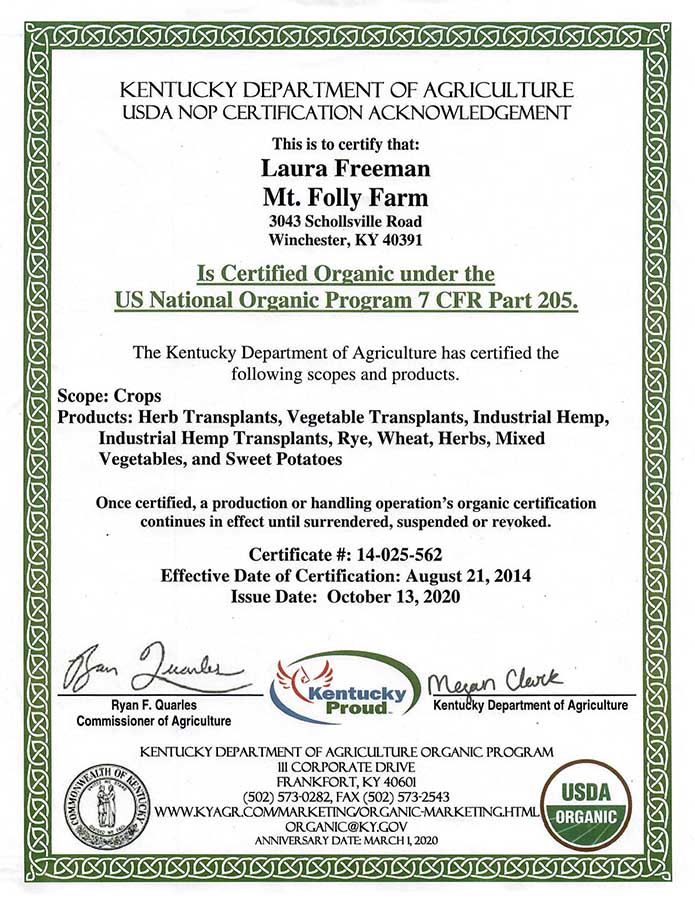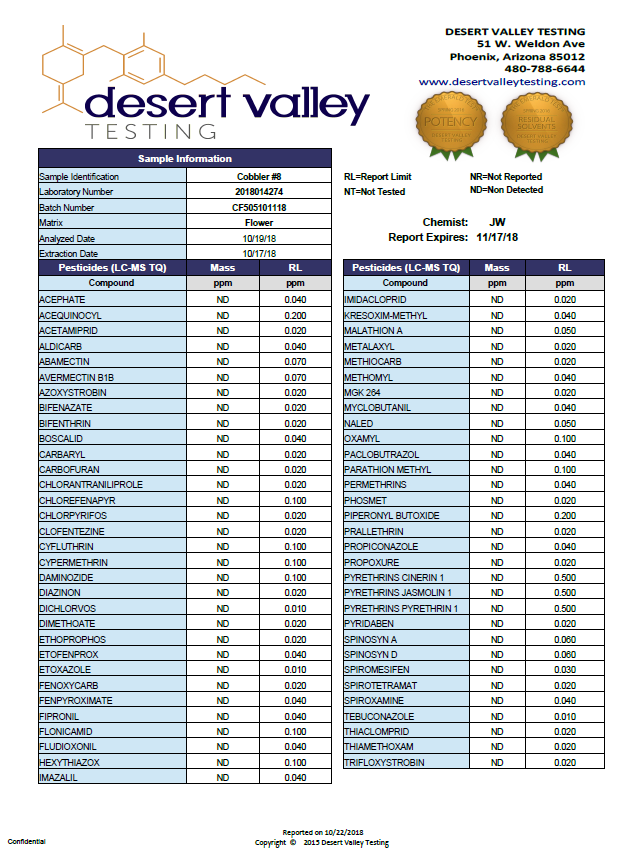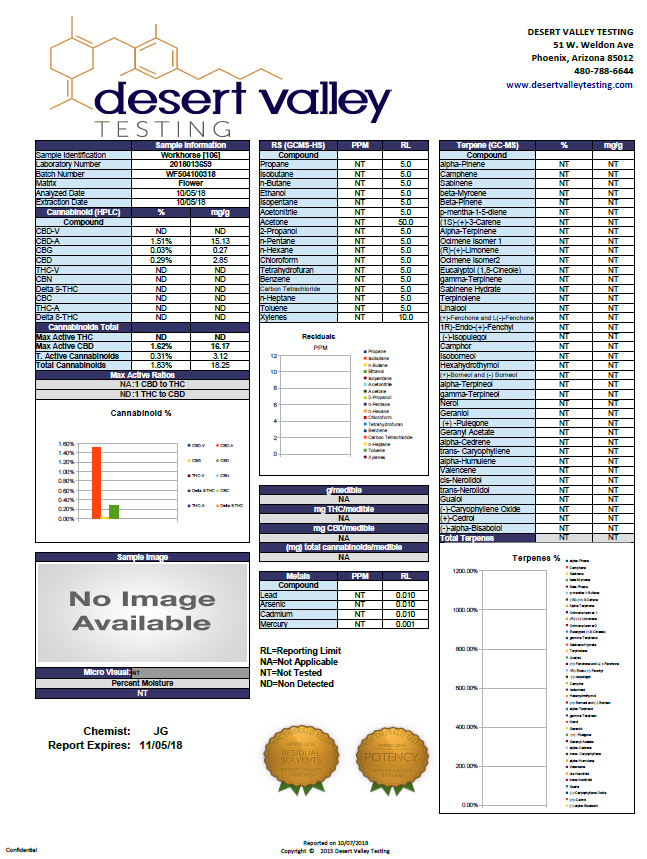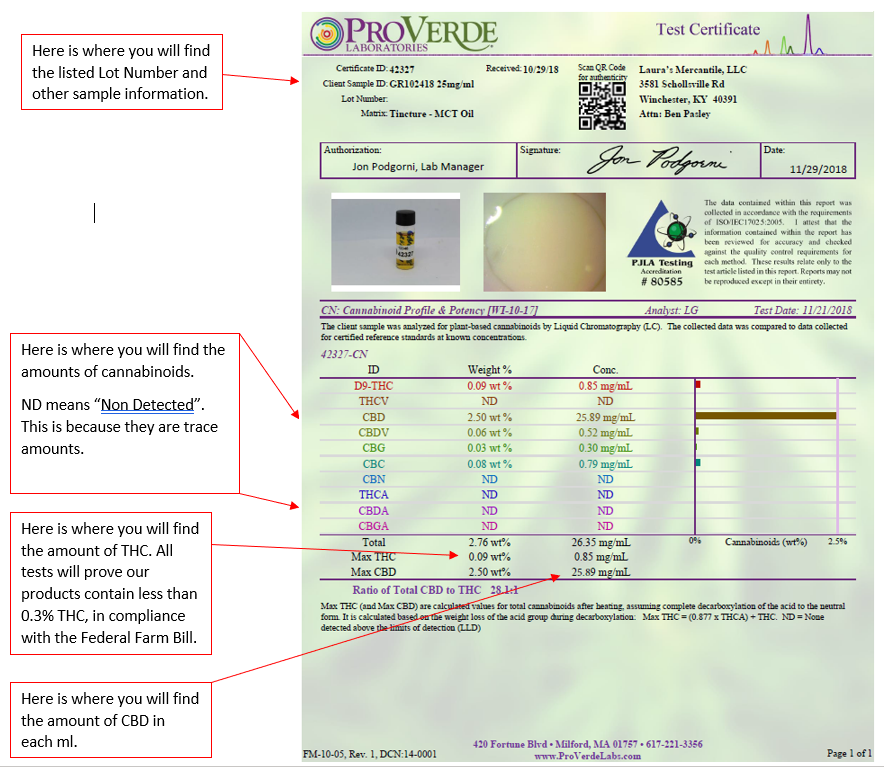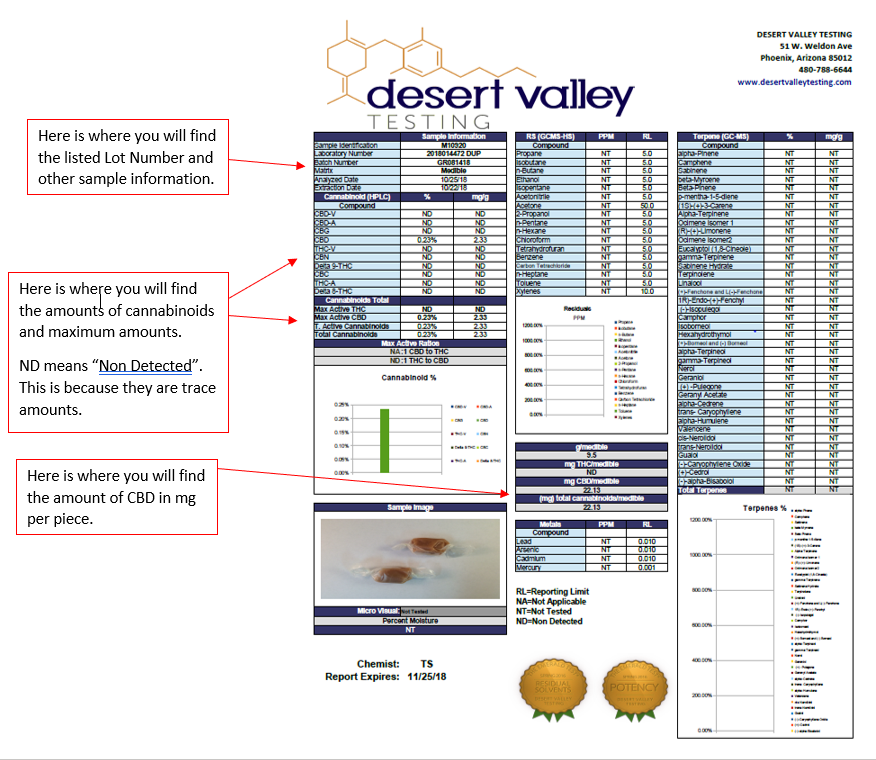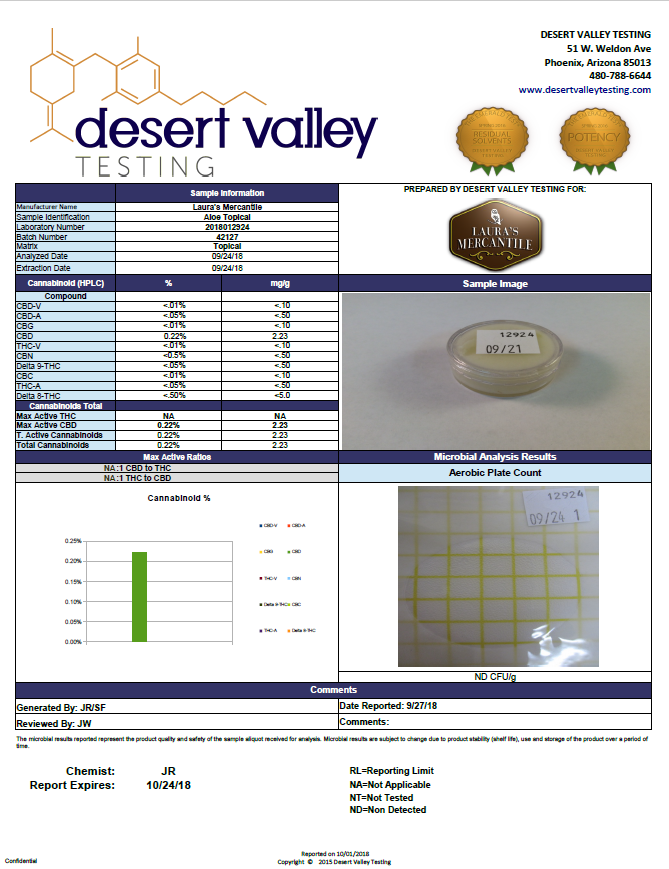Here at Mt. Folly Farm and Laura’s Mercantile, we have a number of third party certifications. From our license to grow hemp to our USDA organic certification and third-party lab testing processes, we’ll walk you through standards we exact from field to final product — ensuring you receive authentic farm products true to what’s on the label.
Contents
Click on a numbered item to jump to that particular topic on the page.
- Approval to Grow Hemp In Kentucky
- Mt. Folly Farm’s USDA Organic Certification
- Testing Homestead Alternatives Hemp CBD Products
- Find Your Homestead Alternatives COA / Lab Tests
We Start on the Farm
We can’t grow hemp without approval and licensing from the Kentucky Department of Agriculture. Each year, we submit a detailed plan for our crop, with field coordinates and our research plan.
We agree to field testing for THC levels by an outside hemp inspector prior to harvest. THC is the compound that produces the psychedelic effect, or “high”, associated with cannabis. By law our hemp floral material can have only a trace amount of THC, no more than 0.3%.
Below is our 2019 license for participation in Kentucky’s Industrial Hemp Research Pilot Program.
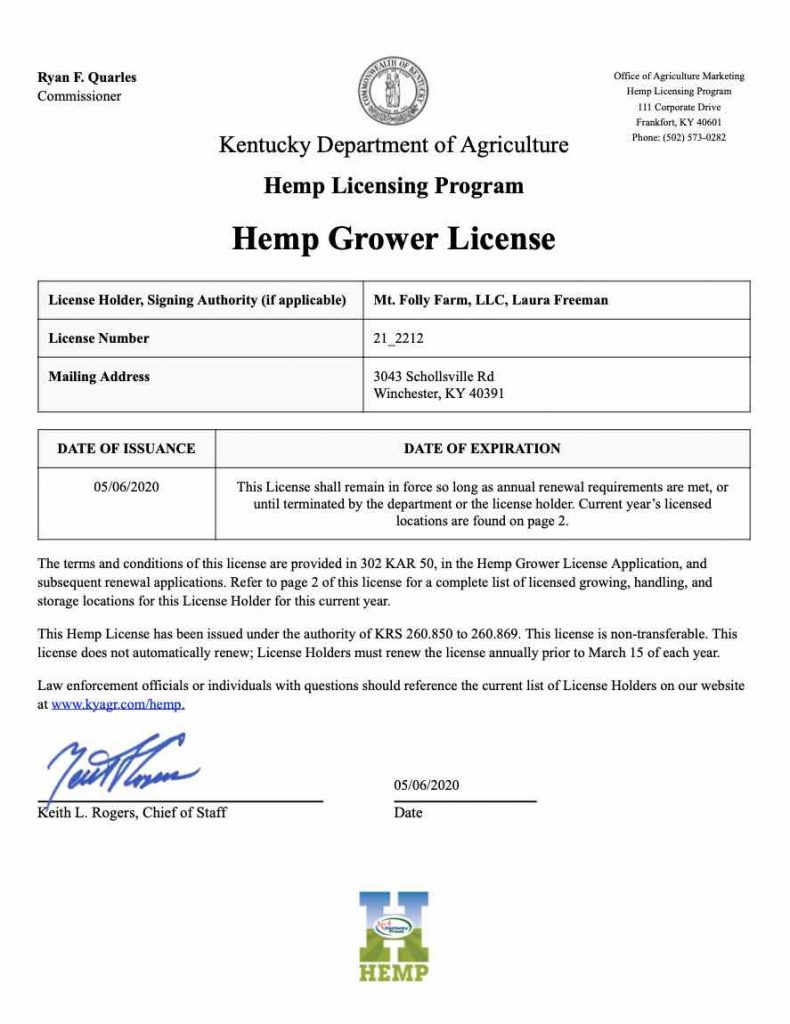
USDA Organic Certification
Crops at Mt. Folly Farm are certified USDA organic. This certification, among other qualifications, means no chemical fertilizers, pesticides or herbicides are used on the hemp.
Our fields have to be managed organically for three years before the field, and thus the crop, can be certified organic. In addition to field histories, through each season we maintain detailed records regarding each field and crop. We also have an organic inspection each year, which is no easy feat to pass.
Frequently, you’ll hear that “all hemp is organic,” because no pesticides or herbicides are approved for the crop. While technically this is correct, many pesticides and herbicides are in development for hemp and the lack of approved pesticides and herbicides doesn’t prevent farms from using chemical “burn downs,” such as Round-Up, before planting. We do NOT do this.
Our USDA certification is provided below, and includes our hemp crop that is used to make Laura’s Homestead Alternatives CBD products and hemp chocolates.
Creating and Testing Homestead Alternatives Hemp CBD Products
There are a number of tests and certifications performed from the time we harvest our hemp to CBD extraction and to a finished Homestead Alternatives CBD product.
In the fall, we harvest our organic hemp and hang it in a re-purposed tobacco barn to dry. At this point, we conduct a test confirming there are no pesticides present.
Since our hemp is grown in USDA certified organic fields, this pesticides test is redundant, but our customers have voiced it’s important to them, so we are happy to oblige.
Below is a sample report showing non-detected (ND) pesticides.
Once the hemp is dry, we send a sample of flower material from our plants for a CBD test at an accredited third-party lab. Below is a sample of our CBD flower tests.
Next, we strip the floral material from each plant into a “super-sack” weighing about 100 pounds. This material is transported in a farm truck to our hemp extractor.
Our extractor is not certified organic, but it is on the docket for the upcoming months. The Kentucky Department of Agriculture has agreed to do the certification. We have great confidence that our extractor can qualify.
Before our hemp CBD extract, which is formulated at 25mg / mL, is released for sale, each batch is tested for CBD levels and THC levels. Below is a sample test, with highlights on the critical measurements.
Testing for Terpenes
We also complete testing for the terpenes profile, which you can see a sample of below. For this particular batch, you’ll notice farnasene is the predominant terpene. Farnesene, which is thought to have anti-inflammatory properties, can be found in turmeric and is commonly found in fruit coatings, like green apple skins.
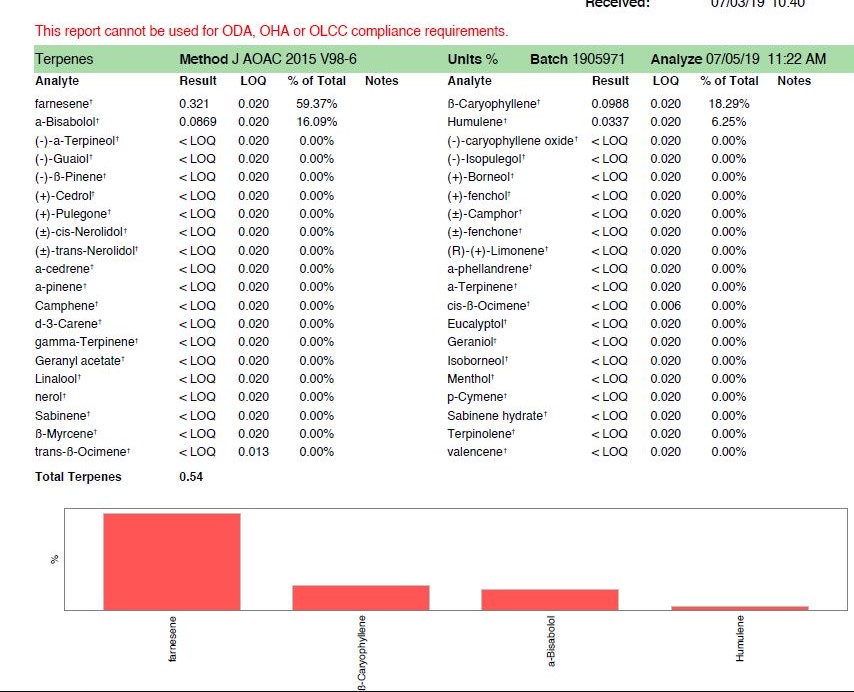
Testing CBD Caramels
Our popular CBD caramels are tested, too. Our caramels are hand-made, cooked, cooled and wrapped in small batches. The batch tests ensure each caramel is within a proper tolerance of 20mg of CBD per piece. Below is an example of a CBD Caramel test.
Testing CBD Topical Lotions and Creams
Lastly, our CBD lotions, creams, and other topicals are also third-party tested. This test ensures that each product, made in small batches by Kentucky herbalist artisans, does indeed contain the listed amount of CBD. Below is an example of a CBD topical test result.
Find Your CBD Lab Results (COA)
Search the lot number found on your bottle or package below to see the relevant lab results.
Further Explanations
Laura’s Hemp Chocolates contain 0.00% THC. Hemp seeds may be regarded as “THC free,” because if there is any THC present, the level is so small and so close to zero that it often falls below the level that most scientific instruments can detect.
The hemp grown for Homestead Alternatives CBD products naturally has a trace amount of THC. By law, this can be no more than 0.3%. We test and post online the lab results for every batch of all Homestead CBD products, which verifies the concentration of THC.
These analytic tests are completed at an accredited third party lab, and routinely our products come in even lower than the 0.3% limit. For example, a recent test for THC in Homestead Alternative Hemp Extract was 0.13% by weight. A recent test on a full-spectrum hemp caramel showed 21 mg CBD and no THC was detected!
Why Don’t We Remove 100% of the THC?
We intend to stay as close to the plant as possible, and will not contract with chemists to turn our plants into powdery white isolate. The data is good that full spectrum hemp has more benefits than isolate, and there is emerging science regarding the entourage effect.
Because our CBD products are full spectrum, there is a chance that a person using Homestead Alternatives products could test positive in a drug screening. This depends on the type of drug screening, and of course differs from person to person. If you have concerns about passing a drug screening, the only true guarantee is avoiding any cannabis-derived product. We encourage speaking with your company’s HR department as well to clarify their policy.
To make sure you are in the know, on the bottom of your Homestead Alternative CBD oil, on the back of a package caramels or chocolates, or on the hang tag that goes with the CBD oil, you’ll find a lot number, which connects the product to its batch test. Search your lot or batch number using the search field above.
Questions?
Feel free to contact us with questions at (859) 474-8218 or you can email us.
